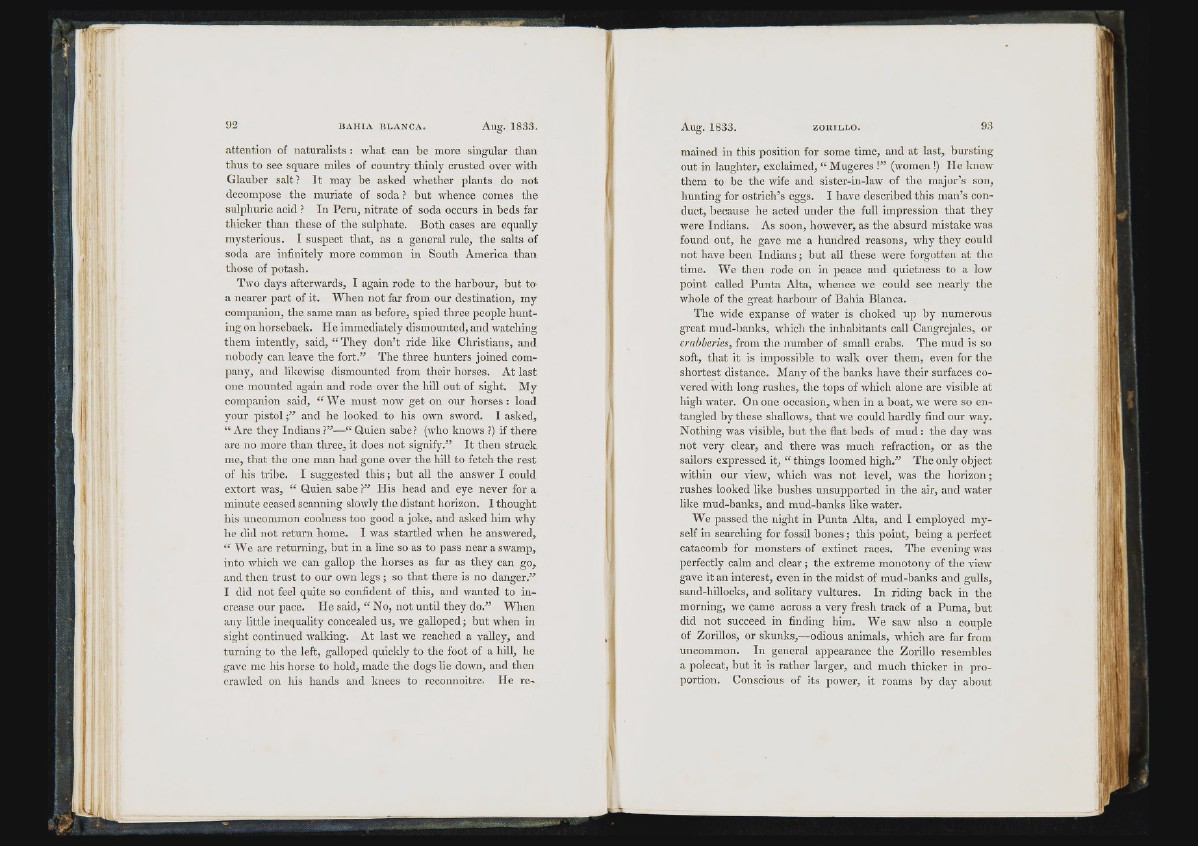
attention of naturalists : what can be more singular than
thus to see square miles of country thinly crusted over with
Glauber salt? It may be asked whether plants do not
decompose the muriate of soda ? but whence comes the
sulphuric acid ? In Peru, nitrate of soda occurs in beds far
thicker than these of the sulphate. Both cases are equally
mysterious. I suspect that, as a general rule, the salts of
soda are infinitely more common in South America than
those of potash.
Two days afterwards, I again rode to the harbour, but to
a nearer part of it. When not far from our destination, my
companion, the same man as before, spied three people hunting
on horseback. He immediately dismounted, and watching
them intently, said, “ They don’t ride like Christians, and
nobody can leave the fort.” The three hunters joined company,
and likewise dismounted from their horses. At last
one mounted again and rode over the hill out of sight. My
companion said, “ W e must now get on our horses: load
your p i s t o l a n d he looked to his own sword. I asked,
“ Are they Indians ?”—“ Quien sabe ? (who knows ?) if there
are no more than three, it does not signify.” It then struck
me, that the one man had gone over the hill to fetch the rest
of his tribe. I suggested th is; but all the answer I could
extort was, “ Quien sabe ?” His head and eye never for a
minute ceased scanning slowly the distant horizon. I thought
his uncommon coolness too good a joke, and asked him why
he did not return home. I was startled when he answered.
We are returning, but in a line so as to pass near a swamp,
into which we can gallop the horses as far as they can go,
and then trust to our own leg s; so that there is no danger.”
I did not feel quite so confident of this, and wanted to increase
our pace. He said, “ No, not until they do.” When
any little inequality concealed us, we galloped; but when in
sight continued walking. At last we reached a valley, and
turning to the left, galloped quickly to the foot of a hill, he
gave me his horse to hold, made the dogs lie down, and then
crawled on his hands and knees to reconnoitre. He remained
in this position for some time, and at last, bursting
out in laughter, exclaimed, “ Mugeres !” (women !) He knew
them to be the wife and sister-in-law of the major’s son,
hunting for ostrich’s eggs. I have described this man’s conduct,
because he acted under the full impression that they
were Indians. As soon, however, as the absurd mistake was
found out, he gave me a hundred reasons, why they could
not have been Indians; but all these were forgotten at the
time. We then rode on in peace and quietness to a low
point called Punta Alta, whence we could see nearly the
whole of the great harbour of Bahia Blanca.
The wide expanse of water is choked up by numerous
great mud-banks, which the inhabitants call Cangrejales, or
crabberies, from the number of small crabs. The mud is so
soft, that it is impossible to walk over them, even for the
shortest distance. Many of the banks have their surfaces covered
with long rushes, the tops of which alone are visible at
high water. On one occasion, when in a boat, we were so entangled
by these shallows, that we could hardly find our way.
Nothing was visible, but the flat beds of mud: the day was
not very clear, and there was much refraction, or as the
sailors expressed it, “ things loomed high.” The only object
within our view, which was not level, was the horizon;
rushes looked like bushes unsupported in the air, and water
like mud-banks, and mud-banks like water.
We passed the night in Punta Alta, and I employed myself
in searching for fossil bones; this point, being a perfect
catacomb for monsters of extinct races. The evening was
perfectly calm and clear; the extreme monotony of the view
gave it an interest, even in the midst of mud-banks and gulls,
sand-hillocks, and solitary vultures. In riding back in the
morning, we came across a very fresh track of a Puma, but
did not succeed in finding him. We saw also a couple
of Zorillos, or skunks,—odious animals, which are far from
uncommon. In general appearance the Zorillo resembles
a polecat, but it is rather larger, and much thicker in proportion.
Conscious of its power, it roams by day about
I
'4!
'"'i I
' . i l I
'■All